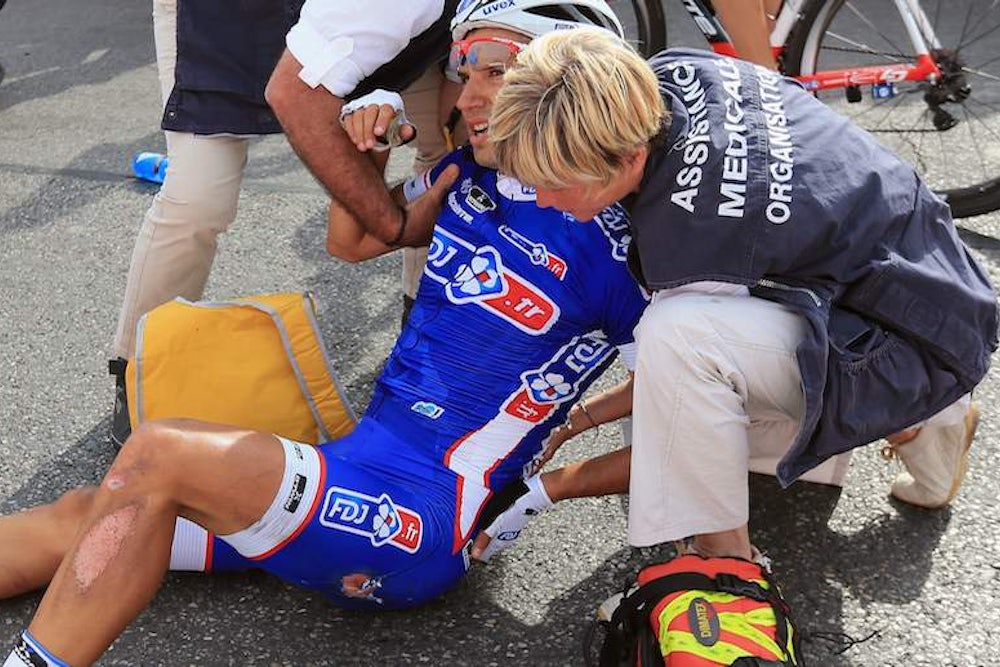“I read with interest," Evelyn Waugh wrote to his bessotedly francophile friend Nancy Mitford, “how the politest people in the world treated the Italian cyclists.” It was the summer of 1950. After the Tour de France had been started by Orson Welles (go figure) the race was comparitively uneventful, until the Pyrenees.
As Chris Froome in the yellow jersey has said, "One of the best things about our sport is that the spectators can get close to the top riders in the world and feel the excitement and the colour,” and this is quite true. I’ve sat outside a cafe in a village in Normandy before a stage began and at the next table half a dozen Italian cyclists were sitting, forcing down as much performance-enhancing substance as possible, in the form of espresso, a casual intimacy you wouldn’t expect in most sports. I’ve walked to the start of a morning trying to avoid the cyclists as they gather, and I’ve watched the riders go past near enough to touch them, which is the problem.
As they go up a steep climb, the spectators hem them in, run besides them, and sometimes give an illicit push. On occasion proximity is altogether too intimate, so that a bike’s handlebars get tangled with one of the fans and the rider falls. Or there’s overt violence. What Waugh had read about with interest was the incident on the Col d’Aspin in the Pyrenees. As the crowd rabbled the riders, several crashed, one of them the great Gino Bartali, who had won the Tour in 1938 and 1948 (and between had done something more heroic than that, working with the Italian resistance and helping Jews escape deportation). No sooner had he fallen than a few drunken French fans beat him up. Bartali managed to get back on his bike and win the stage, but the Italians then withdrew from the race in protest.
Almost worse was what happened in 1975. Eddy Merckx was one of the greatest cyclists of all times, some would say the greatest of all. He won the Giro (the Tour of Italy) and the Tour de France five times each, with a last double or twofer in 1974. The following year he was near the top of the famous Puy de Dôme climb, when a spectator—a fan? or maybe what hits the fan?—leaped out and punched him ferociously in the abdomen. This ended Merckx’s chance in the race, and helped end his career. The miscreant was identified, prosecuted, and fined a token one franc, which may have said something about French justice.
Or about French xenophobia. What happened to the Englishman Mark Cavendish this week, on the second Wednesday of the Tour, wasn’t as dangerous as what happened to the Italian Bartali or the Belgian Merckx, but was almost nastier. As he was riding in the time trial towards the famous island-monastery of Mont Saint-Michel, a spectator doused him with urine. His team manager Patrick Lefevere said, almost superfluously, "You had only to smell his jersey.”
This may have been an obnoxious form of revenge for the previous day when Cavendish collided near the finish with the Dutch rider Tom Veelers, who fell heavily. Endless replays suggest that at worst it was six of one and half a dozen of the other or at Veelers was at least as much to blame. In any case, he’s Marcel Kittel's lead-out man, and Veelers’s fall didn’t stop Kittel winning that stage ahead of Andre Greipel, another German—and Cavendish. His own team seemed to have gone missing, and didn’t provide the lead-out he required
One way and another it has been a frustrating Tour so far for poor Cav. Belying his pre-race status as the favourite for sprinting honours, he has suffered series of setbacks, with one more on Thursday when he was beaten again by Kittel, who pointedly, or gratuitously, dedicated his victory to Veelers. Cavendish has one ally in Chris Froome, who said that “Mark is one of the big characters in the sport. Some people love him, some people hate him, but to do something disrespectful like that ruins the whole atmosphere,” which is hard to deny.
But then Froome is being dissed himself, or so he says. After one brilliant performance in the mountains he gave another in the time trial. He was second to Tony Martin, but he put so much time into his rivals for the yellow jersey that he is now well over 3 minutes in the lead—and this is the Tour, which Bradley Wiggins won by 3 minutes 21 seconds from his teammate Froome last year, and which Greg LeMond won in 1989 from Laurent Fignon by no more than 8 seconds, after they had raced for 3285 kilometres! Anything can happen in a bike race, but Alejandro Valverde, Bauke Mollema, and Alberto Contador lie behind Froome and are now resigned to fighting for the runner-up’s place.
And still Froome faces day by day what he calls “disrespectful” questions about doping, which may also have an anglophobic edge to them (after twelve stages, the highest placed French rider is Jean-Christophe Péraud in 10th place, at a hopeless 5 minutes 39 seconds behind the leader, and his next compatriot is Romain Bardet in 21st). Wiggins had to field the same questions last year, and Froome has so far has merely looked frustrated and aggrieved rather than exploded into expletives as Brad did.
But there it is. With so many shadows hanging over it, the Tour—and the riders, and the maillot jaune most of all—have to grin and bear it, deal with the inevitable suspicious questions, and hope for the day, in no very near future, when those shadows have gone.
